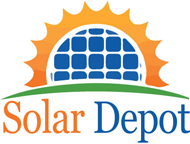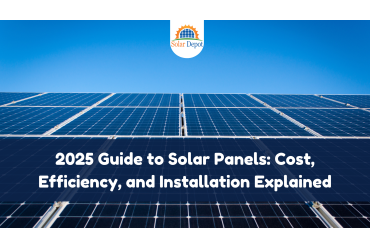2025 Guide to Solar Panels: Cost, Efficiency, and Installation Explained
Solar energy is rapidly becoming a go-to solution for addressing Nigeria’s energy challenges. In a country where grid electricity is often unreliable and fuel costs for generators continue to rise, solar power offers a clean, sustainable, and cost-effective alternative. If you’re considering going solar in 2025, this guide will break down everything you need to know — from the cost of solar panels and their efficiency to the installation process tailored to the Nigerian market.
What Are Solar Panels?
Solar panels are devices that convert sunlight into electricity. They consist of photovoltaic (PV) cells that harness energy from the sun and supply it as usable electricity for homes, businesses, or other applications.
In Nigeria, solar panels are more than just an energy solution—they are a lifeline in regions with inconsistent grid power. From rural communities seeking off-grid systems to urban dwellers wanting to reduce their reliance on noisy, fuel-guzzling generators, solar power is revolutionizing energy access in the country.
Cost of Solar Panels in Nigeria (2025)
One of the biggest questions Nigerians ask is, "How much will it cost me to install solar panels?" The answer depends on a variety of factors. Here's a breakdown of what to expect:
Average Solar Panel Costs in Nigeria:
Residential Solar Systems: ₦2,000,000 – ₦5,000,000 (depending on size and battery capacity).
Commercial Solar Systems: ₦10,000,000 – ₦50,000,000 (for larger operations).
Key Factors Affecting Costs
System Size: The larger the solar system (measured in kilowatts, or kW), the higher the cost, but also the greater the electricity it can generate.
Battery Storage: A solar battery is often essential in Nigeria to store power for nighttime use or during cloudy periods. Batteries can account for 40–60% of the total cost.
Solar Panel Type: Monocrystalline panels (high-efficiency) tend to cost more than polycrystalline panels.
Installation Costs: Installation prices in Nigeria depend on labor rates, the complexity of your roof, and the local availability of certified installers.
Why Solar is More Affordable in 2025
Thanks to advancements in solar technology and increased local availability, the cost of solar panels has decreased by over 20% in the past five years. Government incentives, such as the Rural Electrification Fund (REF) and subsidies through the Solar Power Naija initiative, further make solar accessible to everyday Nigerians. These initiatives are key in driving the adoption of renewable energy across the country.
Efficiency of Solar Panels in Nigeria
Efficiency refers to how well a solar panel converts sunlight into usable electricity. In a country like Nigeria, where sunlight is abundant (averaging 6–9 hours of daily sunlight), solar panel efficiency is less about maximizing sunlight and more about choosing the right system for your energy needs.
Types of Solar Panels Common in Nigeria:
Monocrystalline solar panels:
Most efficient (20–22%).
Ideal for limited roof space.
Performs well in high temperatures (perfect for Nigerian weather).
Polycrystalline solar panels:
Slightly less efficient (16-18%).
More affordable and widely available in Nigeria.
Thin-film Solar Panels:
Less common in Nigeria due to lower efficiency.
Suitable for large-scale installations in rural or commercial areas.
Factors That Impact Solar Efficiency in Nigeria:
Shading: Nearby trees or buildings blocking sunlight will reduce output.
Heat Resistance: Panels with higher temperature coefficients are better suited for Nigeria’s hot climate.
Maintenance: Dust accumulation can lower panel efficiency. Regular cleaning is essential to keep your system operating at full capacity.
The Solar Installation Process in Nigeria
Installing solar panels is a straightforward process, but it requires proper planning and professional execution to ensure long-term performance. Here’s how it works:
Step 1: Energy Audit and Consultation
Your solar provider will conduct an energy audit to assess your power needs. For example, a household in Lagos with heavy appliance usage may require a 5kW system, while a rural home with basic lighting needs may only need 1kW.
Step 2: System Design
Based on your energy goals and budget, the installer designs a customized system. This includes selecting the right solar panels, inverter, batteries, and charge controller.
Step 3: Permitting and Approvals
For urban areas like Lagos and Abuja, permits may be required before installation, particularly for large commercial systems.
Step 4: Installation
The panels are mounted on your roof (or on a ground-mounted structure), connected to an inverter, and wired to your home’s electrical system. The entire process can take 1–3 days for residential systems.
Step 5: Testing and Activation
After installation, the system is tested to ensure it is functioning properly. You’ll also learn how to monitor your system’s performance using apps or dashboards.
Maintenance Tips for Nigerian Conditions
Clean your panels regularly to remove dust and debris.
Check batteries monthly to ensure they are functioning properly.
Hire certified technicians for annual inspections.
How Solar Pays Off in Nigeria
Short-Term Financial Benefits:
Lower Energy Costs: With the grid often unreliable and fuel prices rising, solar panels provide free electricity after installation.
Tax Credits and Subsidies: Through programs like the Solar Power Naija initiative, households and businesses can access subsidized loans for solar systems.
Long-Term Return on Investment (ROI):
The typical payback period for solar panels in Nigeria is 3–5 years. After this period, you can enjoy 20+ years of free electricity. Additionally, solar systems protect against the volatility of generator fuel prices.
Environmental Benefits:
Solar energy helps reduce Nigeria’s dependence on diesel and petrol generators, which are among the largest contributors to air pollution. A single 5kW solar system can offset 5–10 tons of CO2 annually.
Challenges of Solar in Nigeria and How to Overcome Them
High Upfront Costs: Many Nigerians see solar as expensive. Solution: Take advantage of payment plans or Solar Power Naija loans.
Lack of Awareness: Many people are unfamiliar with how solar works. Solution: Partner with a trusted brand like Solar Depot to receive guidance and education.
Maintenance Issues: Dust, heat, and humidity can reduce panel performance. Solution: Invest in high-quality panels and perform routine maintenance.
Conclusion: Is Solar Right for You in 2025?
Absolutely! Solar energy offers a sustainable, cost-effective, and reliable solution to Nigeria’s energy challenges. Whether you’re in Lagos, Kano, or Port Harcourt, going solar can reduce your electricity bills, increase your home’s value, and give you uninterrupted power supply.
Ready to embrace clean energy? Contact Solar Depot today for a free consultation and system design tailored to your energy needs. Let us help you achieve energy independence in 2025.






